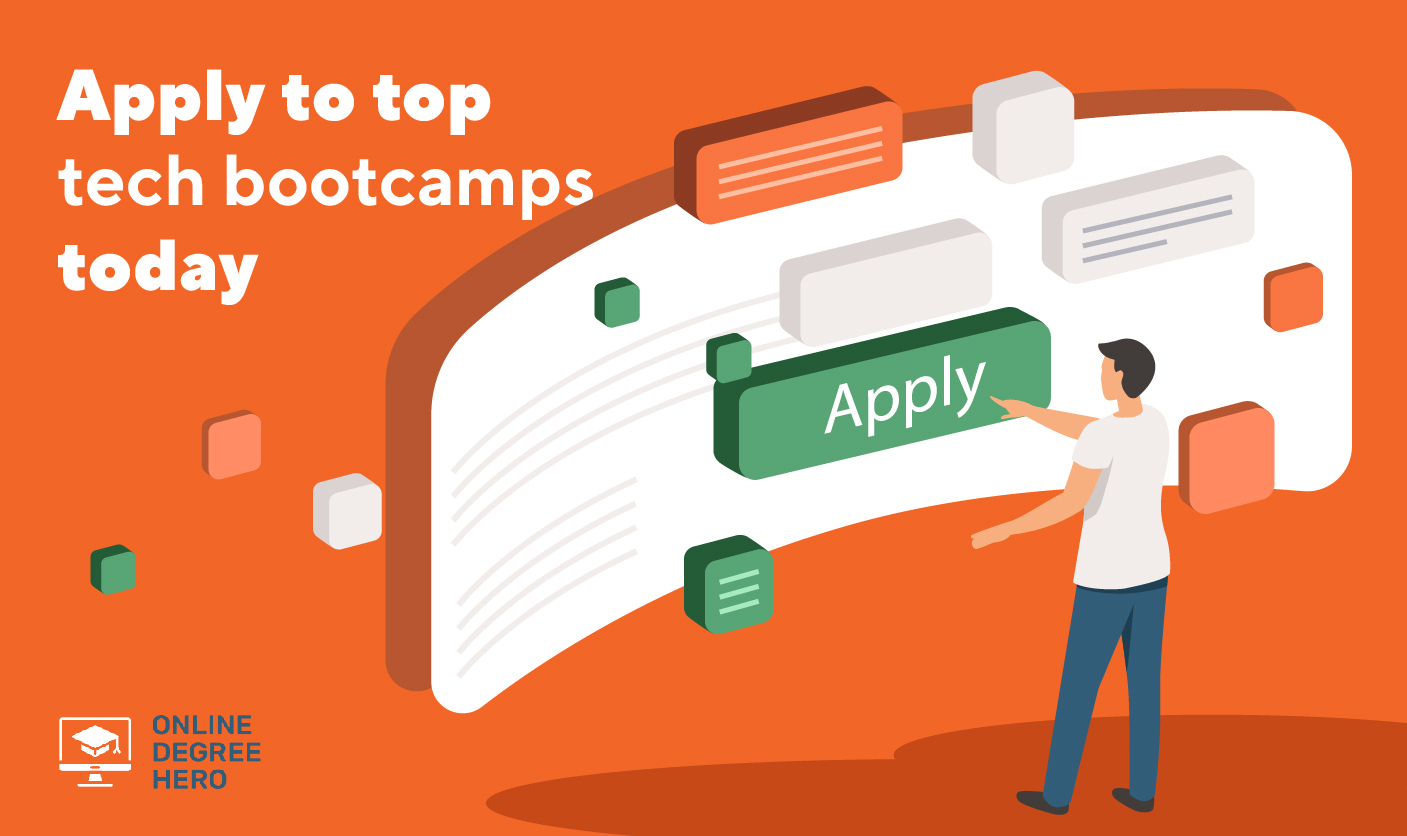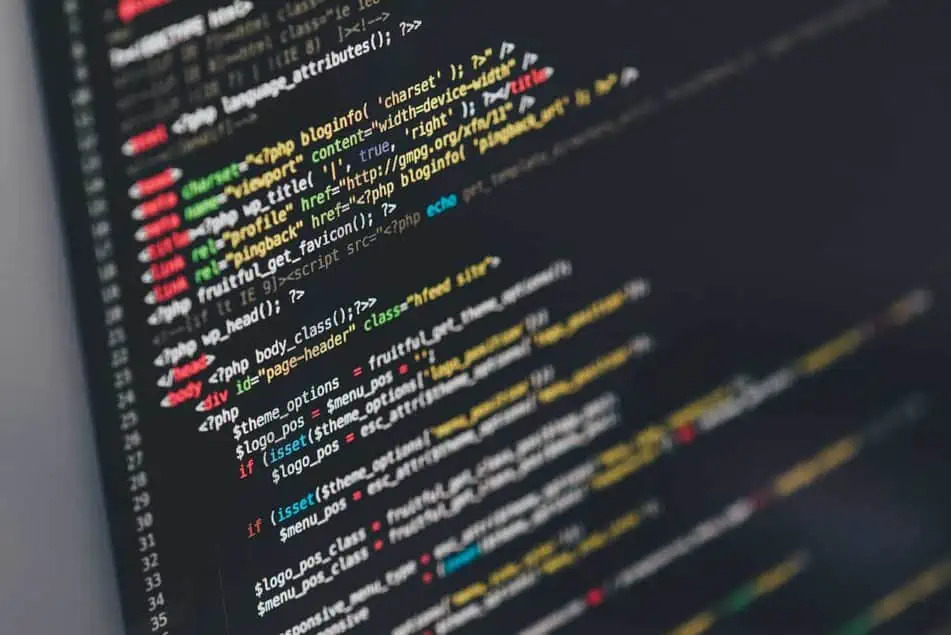
How to Learn C++: Top Learning Resources
There are some programs where speed really matters. Think about games. If you had a game that lagged all of the time because your console was still trying to catch up with your movements, you would probably get bored, right? A popular language among programmers who want to build speedy applications and games is C++, a quick and powerful language.
We know that starting to learn a programming language can feel intimidating, especially if you have never learned one before. We wrote this guide to bring together some of the best learning resources on C++ so you can easily make your first steps toward learning the language.
By the end of reading this guide, you will know about three courses, three tutorials, and three books which may help you learn C++.
What is C++?
C++ (said like “c-plus-plus”) is an object-oriented programming language used for games development, web browsing, application development, robotics, and more. C++ is built upon the C programming language and has been called “C with classes” by many developers because C++ includes classes and objects.
C++ is known for giving programmers good control over the memory used by an application. This is made possible in part due to pointers, which allow programs to manage their own memory. C++ is known for being “closer to the computer” in that the programming language is lower-level. This means the language includes less abstraction on top of the computer’s architecture.
The C++ language was developed by Bjarne Stroustrup who released the language in 1995. To this day, C++ has an active developer community and the language has been updated many times.
Why Should You Learn C++?
C++, with decades of history, is a programming language you should consider learning. But why is C++ worth your time when there are so many other languages out there which are newer and are still incredibly popular? Here are a few reasons why you should learn C++:
- C++ is used for many reasons. C++ is used for games development, desktop application development, systems programming, building web browsers, and mobile application development. This means that your knowledge of C++ can be applied to a range of fields. If you decide that you would prefer to do systems programming, you can do that. Or you could switch to games development with some time and extra learning. Or you could do something else with C++.
- C++ is fast. If you are building small applications, you may think that a lot of languages are fast. But for bigger applications, speed really matters, and is easy to notice. C++ is a good choice if you want to learn a programming language that is fast and efficient.
- C++ skills are rewarded in the job market. C/C++ Software Engineers earn $92,046 per year, on average. This statistic was collected from Glassdoor who report on salaries for various careers, including many jobs that involve programming and technology.
- C++ has a big community. According to the TIOBE Index, which tracks the popularity of various programming languages, C++ is the fourth most-popular programming language. This shows that there are plenty of people who are actively using C++. You should be able to find many other developers who know C++ with whom you can chat.
Many developers each year choose to learn C++ for some or all of the reasons above. And there are more reasons you may want to learn C++, such as if you want to become a virtual reality developer. In any case, you should spend time considering exactly why you want to learn C++ before you get into the nitty-gritty of learning. With a strong conviction as to why you want to learn a language, you will be able to stick at your learning when the times get tough.
The Best Books for Learning C++
There are some excellent books written on the C++ programming language. Many developers consider books a go-to way of learning about C++. To help you find some books worth reading, we have done some research and found three top C++ books.
‘Programming: Principles and Practice Using C++’ by Bjarne Stroustrup
What better way is there to learn a programming language than to learn from the creator of the language? This book was written by Bjarne Stroustrup, the creator of C++, for beginners to the language. Stroustrup recommends this book to anyone who has never coded before or who has some coding experience and wants to build a new skill.
The book covers the fundamental features of the C++ language, which will give you the information you need to write simple programs. Later in the book, you will read about more specialized topics that will be important in more advanced programs, such as testing.
‘Beginning C++17: From Novice to Professional’ by Ivor Horton and Peter Van Weert
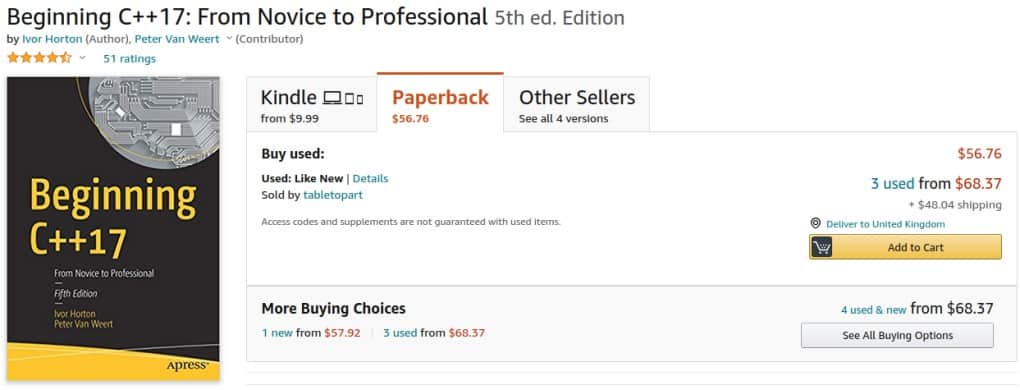
Now in its fifth edition, this book has been updated to talk about the basics of C++17, a more recent version of the C++ language. This book does not assume that you have any prior experience with programming, so you can reasonably read this book if you are a complete beginner. Throughout your reading, you will learn about topics like variables, functions, types, and object-oriented programming.
‘C++ Primer’ by Stanley Lippman, Josée Lajoie, Barbara Moo
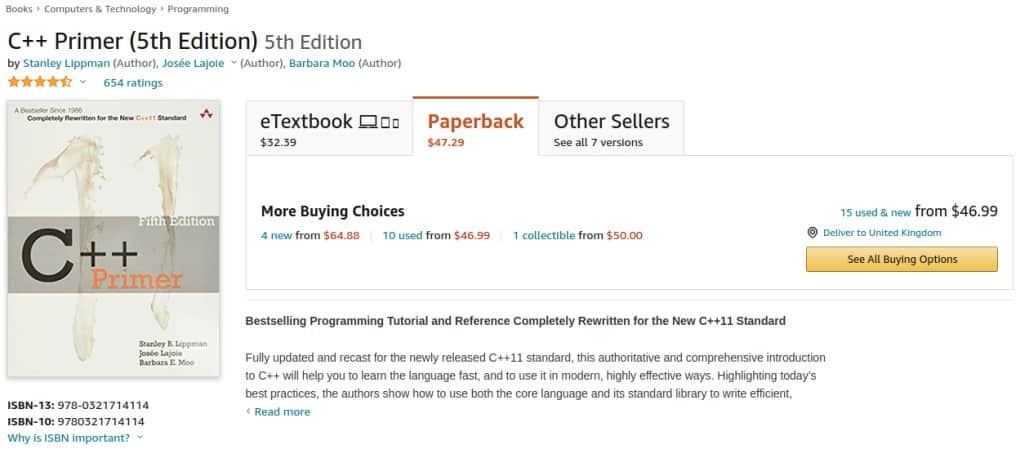
C++ Primer has been a bestselling book since 1986, according to the cover of the fifth edition. The fifth edition covers how to use C++ and the C++11 version of the language. While this book is more out of date than others, the concepts you learn in this book will be invaluable as you continue to learn the C++ language.
This book says that you will learn the reasons behind the rules in C++, which will help you build more comprehension over the topics about which you are reading. You will also be given a series of examples designed to challenge you.
The Best Courses for Learning C++
With so many courses and course platforms out there, finding a course that meets your needs can be tough. That’s why we have done some research to find three top courses for beginners. The courses we have found should at least give you somewhere to start if you would prefer to learn C++ through a digital course.
Introduction to Programming in C++ by NYU
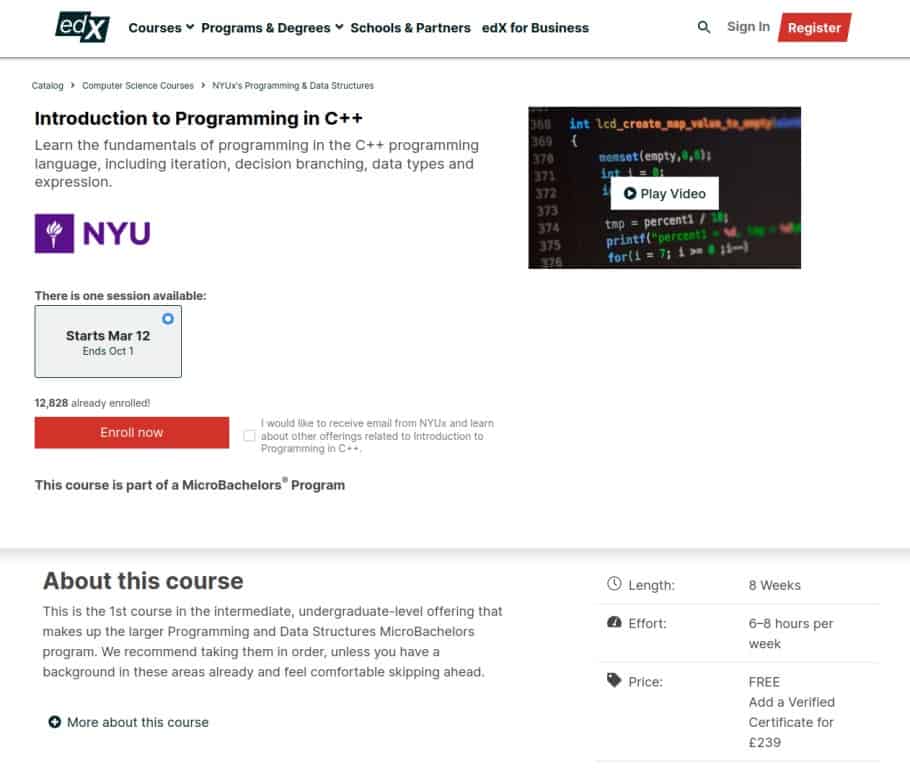
This course is suitable for people with some programming experience who want to learn more about the C++ language. The course takes eight weeks to complete and expects that you devote between six and eight hours per week to your studies.
This course starts with writing a basic C++ program. You will then learn about data types and expressions, if statements, data types, and functions.
Learn C++ Programming from Zero to Mastery in 2021 by Ankit Thakran and Harsh Kajla
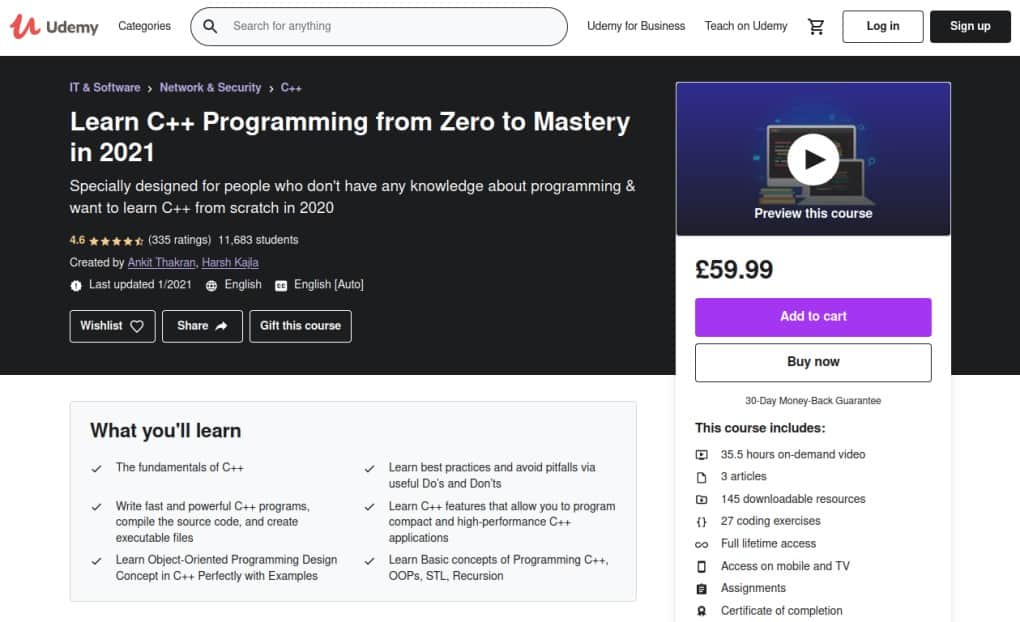
If you have no knowledge of programming or C++ and want to learn C++, this course is worth a look. You will learn the fundamental principles behind C++, how to write fast programs, and the best practices for writing C++ code.
This course is divided into 46 sections and 150 lectures, which in total last over 35 hours. The sections cover topics like operators, storing data, and conditions. You will learn both the theory behind the concepts the course covers as well as how they relate to practical coding.
C++ Essential Training (2018) by LinkedIn Learning
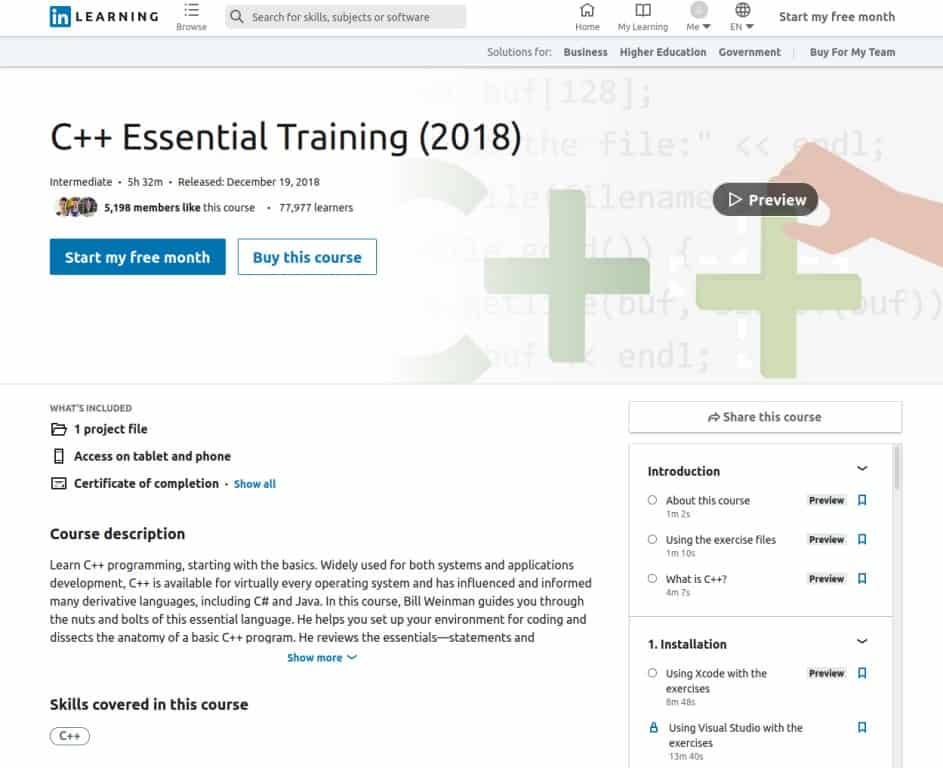
This tutorial on LinkedIn Learning is a good place to start learning C++. At the beginning of the course, the instructor talks about how to set up your coding environment and how to write a basic program. Over the course of the next modules in the course, you will cover topics like pointers, data types, operators, and functions. There are also exercises for you to complete so you can practice the theory you learn.
This course comes with a shareable certificate which verifies you have finished the materials in the course syllabus.
The Best Tutorials for Learning C++
Web tutorials are a good place to go to learn about a particular topic. You may find tutorials especially useful if you just want to dip your toe into C++ without committing to a full course or a book. Of course, there are tutorials for more advanced topics, too.
Here are three C++ tutorials which are suitable for or aimed at beginners.
CProgramming.com
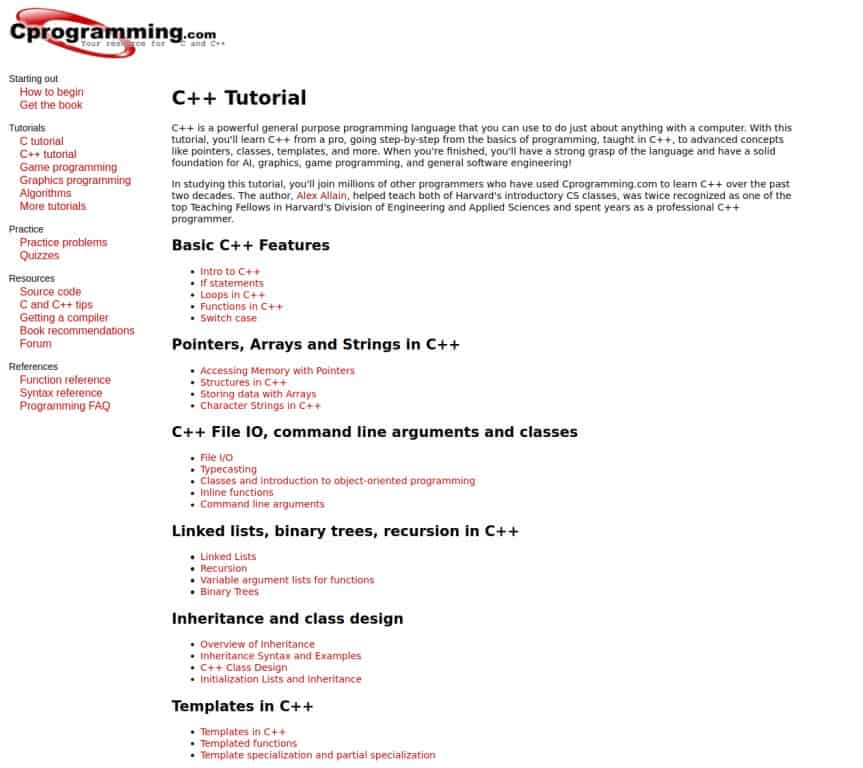
CProgramming.com features extensive tutorials on C and C++ as well as game and graphics programming. There are tutorials for complete beginners and people who have a bit more programming experience. You will also find practice problems and quizzes with which you can challenge yourself.
The C++ tutorials on this website cover topics like if statements, accessing memory with pointers, inheritance, command line arguments, and data types.
LearnCpp.com
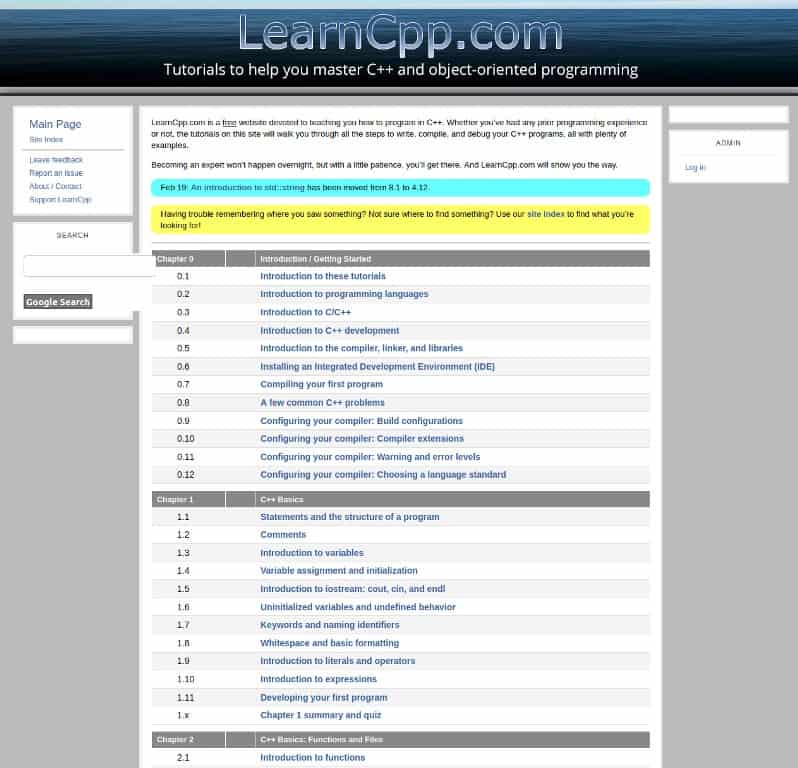
LearnCpp.com is one of the top websites for C++ tutorials. On this website, you will find a list of tutorials covering topics such as C++ basics, functions and files, debugging, among other crucial concepts you should learn.
There are 23 chapters of tutorials in total, as well as some extras, which means you should easily be able to find a tutorial on any beginner concepts that you want to learn about.
CodingUnit C++ Programming Tutorials
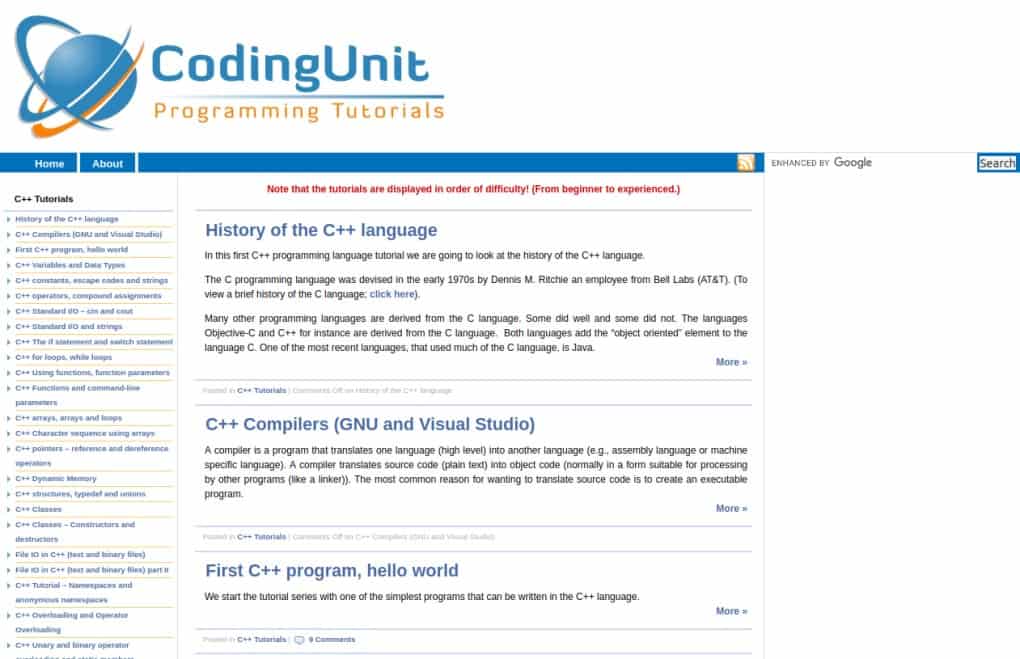
CodingUnit features many programming tutorials on C++. Tutorials cover topics such as working with classes, writing your first C++ program, if statements, I/O, and more. Tutorials come with well-explained code snippets and learning aids like tables to illustrate particular pieces of information. These tutorials are ideal for beginners who are still learning the fundamentals of C++.
Conclusion
Knowing C++ will open up a lot of options in your programming career, whether you decide to become a professional or a hobbyist coder. You could, for example, use your C++ skills to build a web browser for an established business. Or you could use C++ to make games in your free time that you can share with your friends.
You will need to dedicate months to learning C++ and practicing your skills but do not let that deter you from learning the skill. Every skill takes time to learn, practice, and refine. With aid from the resources we have discussed, you will be able to learn what you need to know about C++.

